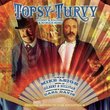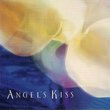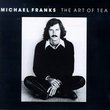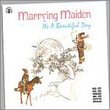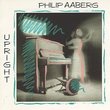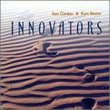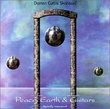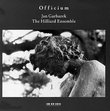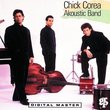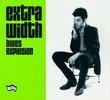| All Artists: Keith Jarrett Title: Carnegie Hall Concert Members Wishing: 0 Total Copies: 0 Label: ECM Records Original Release Date: 1/1/2006 Re-Release Date: 9/26/2006 Album Type: Live Genres: Jazz, Special Interest, Pop Style: Avant Garde & Free Jazz Number of Discs: 2 SwapaCD Credits: 2 UPC: 602498562246 |
Search - Keith Jarrett :: Carnegie Hall Concert
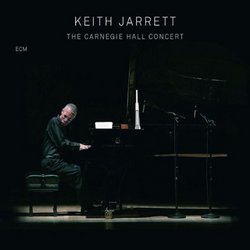 | Keith Jarrett Carnegie Hall Concert Genres: Jazz, Special Interest, Pop
Keith Jarrett is nothing less than a living legend. Audiences flock to his rare performances in the world?s finest concert halls, and it is his unique ability to create music in the moment that has made him most famous ? h... more » |
Larger Image |
CD DetailsSynopsis
Album Description Keith Jarrett is nothing less than a living legend. Audiences flock to his rare performances in the world?s finest concert halls, and it is his unique ability to create music in the moment that has made him most famous ? his spontaneous improvisations often sound as if they?ve been carefully composed over time. His 1975 album, The Köln Concert, catapulted him onto the world stage, and ? at 4 million copies and counting ? is the best-selling solo piano recording of all time. In 2005, Keith Jarrett played his first US solo concert in a decade on the stage of Carnegie Hall, America?s most celebrated venue. One year later to the day, this electrifying night of music will be released. Similarly Requested CDs
|
CD ReviewsWhat Koln was pointing toward 31 years ago o dubhthaigh | north rustico, pei, canada | 09/27/2006 (5 out of 5 stars) "I don't know if it is possible to get too esoteric about Keith Jarrett, but here goes. This is the finest solo recording of his career, and in many ways, both technically and thematically, this is what he was pointing toward with The Koln Concert 31 years ago. In the thinking of Martin Heidegger, Heidegger writes about clearing the ground, not so that Truth and Being can stand there naked in front of you, but so that that very act of preparation might ready you for Truth and Being to lean over and take you into its confidence, appropriate you, if you will, for the Grounding of Being itself. Haven't lost you, have I? Well, you might say that what Koln first suggested by not explicitly stating is articulated more silently now than at any point in Jarrett's career. As Miles pointed out, it's not the notes, but the silences they embrace. The emrace here is as warm and passionate as you hear from any musician in your life. You will recognize moments from Sun Bear, from Bremen Lausanne, The Melody of the Night, Deer's Head Inn, all the way thru to Radiance in the course of these 10 parts and 5 encores. The basic concert is two 30+ minute sets with another 30 minutes of extraordinary encores that will get you to stop the car and get out and applaud, or jump on the coffee table and cheer. It is as beautifully recorded as anything ECM has ever done. The silences are deep, his growling is at an all time minimum, and the applause is so heartily spontaneous that you will know that this is an exceptional CD, and maybe one of the greatest pieces in improvisational music ever. Technically since Koln, Jarrett's left hand has found its own life and never so much as here. I am amazed at how fluid, how pointillist, how bastract and how impressionist his hands draw colours and lines, and the piano responds as a willing lover to Jarrett's intrepid touch. That must be some kinda piano, as a German friend of mine quipped. And unlike some of his recordings, which have evidenced the ordeal as much as the message, this one flows from someplace very deep in this man's soul, without impediment. If you were to buy only 1 CD this year, it should be this one. Jarrett has been on his way to this epoch all of his life, and you should see how well he has arrived. Wonder where he's off to next......." About that Applause R. Mumma | NY | 09/27/2006 (5 out of 5 stars) "When my son and I walked out of Carnegie Hall on September 26, 2005, we both knew that we had seen something that would eventually be shared with the world on a CD (or 2). I'm thrilled to hear this concert again exactly one year later, and the applause brings me right back to our seats high up in the balcony of that magical room. Just as important as the clapping and screaming at the end of each section is the ABSOLUTE audience silence right before and during the music. Please note how the sense of perfect silent attention (and sometimes tension) in that sold-out hall comes through as well as the release between pieces. The piano was unamplified, so no one even dared to shift his or her weight while he was playing. So imagine the joy and freedom of being able to stand and shout and stomp your feet between the five encores. People more knowledgable than me will be writing about this music for years, but I just want to comment on the recording as someone who was present at its creation. ECM could not have done a better job at capturing this night. I personally think that no one better captures the sound of a solo piano, and in this case they have lived up to their high standards. Breaking the two CDs right where Keith took his intermission again emphasizes this as a record of one night's performance. Each CD needs to be listened to in sequence, at a sitting. The first five parts before the intermission would stand as a record on their own (especially part five with its bass and depth), but when you hear the first two parts on disc two, you know you're in the presence of something totally new (yet somehow familiar). Maybe I'm prejudiced (after all, two of those clapping hands being immortalized are mine), but I think this is easily going to surpass Köln as Keith Jarrett's signature recording." Spare me the applause. Pierre Desir | Worcester, MA USA | 01/03/2007 (3 out of 5 stars) "I might like this work much more, if I could listen to it more. Mr. Jarrett is one of my favorites. I put him up there with Thelonious Monk, artists that I can listen to all day long. Their music transports me, and I am grateful their genius. It is a source of inspirartion.
But, this ablum grates on me. Not the music, but the extended applause. Some fool decided that it was necessary to let us hear all of it; every clap and cheer and howl that the audience produces between each musical piece. I find the wonderful meditative state the music produces, ground into irritation by the prolonged howling and whistling that follows. Hearing this noise once is not so bad, as you would at a live concert. But, having to listen to it every time I want to play the disc...? No. An interesting irony, at the same time I bought this album I also purchased Thelonious Monk at Carnegie Hall. At this historic event Monk did not wait for the applause to die down. He let the audience clap for about five seconds and then cut them off by launching into the next piece. A genius in his prime and something Mr. Jarrett should emulate." |

 Track Listings (5) - Disc #1
Track Listings (5) - Disc #1